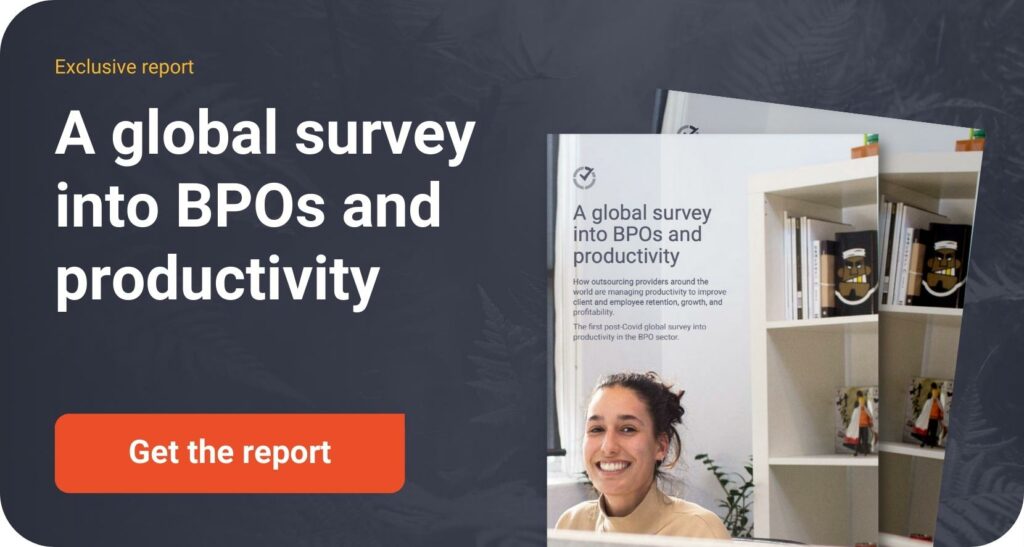It’s a tough old world out there, especially at the moment. The last few years have seen a global health and economic crisis, and we’re far from out of the woods. All organizations need to be more headstrong than ever to deal with the consequences. This extends to BPOs, too, who need to ensure their businesses are resilient.
As BPOs transition to remote work, questions are being raised about how this affects productivity, engagement, and resilience. As a result, Time Doctor has commissioned an extensive survey to uncover how BPOs vary in the core challenges they are experiencing and how they manage them depending on their work model.
Of the organizations we surveyed, only 11% operated in-office models. The rest employed hybrid or fully remote models, indicating that the BPO industry is overwhelmingly turning to flexible work environments. But does this have an impact on the resilience of both the business and its staff?

What is organizational resilience?
Organizational resilience is a measure of how proactive and hardy a business has to be in order to deal with whatever the world throws at it. In other words, a company that is resilient is capable of weathering pandemics and economic crises.
Resilience is a vital trait for a BPO to have in order to ensure its future success. Outsourced teams simply cannot afford to disregard global events or plan ahead for a “normal” year. Recent occurrences have highlighted the need to expect the unexpected and plan for the worst-case scenario. Those that are proactive in their approach will be the most resilient in a crisis.
We have identified five major ways of measuring the resilience of a business, or any other organization:
Financial: A business that can weather the financial storm has got grit. By evaluating its cash flow, profitability, and liquidity, you’ll discover whether it can withstand economic shocks, keep its operations up and running, and bounce back from adversity.
Operational: A truly resilient business knows how to get things done when the going gets tough. By examining how it manages supply chain disruptions, workforce availability, and infrastructure failures, you’ll find out if it has what it takes to keep things moving forward, no matter what.
Customers: The most resilient businesses have a loyal customer base that keeps them afloat, even when things get rocky. By measuring customer loyalty, customer acquisition, and churn rates, you’ll see whether the business can withstand a crisis without losing too many customers.
Technology: In today’s fast-paced digital world, businesses that are tech-savvy and adaptable are the ones that thrive. By checking out a company’s cybersecurity measures, cloud adoption, and agile software development practices, you’ll see if it can weather the storm and adapt to change.
Leadership: Resilient businesses are often led by leaders who know how to navigate choppy waters. By examining factors like management turnover, crisis management experience, and succession planning, you’ll discover whether the business has a steady hand on the tiller and is ready to take on whatever comes its way.
How important is it for BPOs to be resilient?
As the world evolves, resilience is becoming increasingly relevant for BPOs. The pace at which global change occurs is, frankly, staggering at present. That means companies of all sizes and industries must be able to weather anything that comes their way, however unpredictable.
It’s evident how important resilience is just by looking at the last five years. Global catastrophes and dramatic political shifts like the pandemic, the war in Ukraine, and the recession have all taken the world by surprise and produced crisis after crisis as a result. Poor planning and a failure to heed the warnings resulted in many companies losing revenue. While it’s true that many had to close down or let staff go, it’s also true that many made mistakes particularly in allowing their customer experience to suffer, which has tarnished their reputations.
The pandemic, in particular, has emphasized the need for resilience. In fact, 74% of C-suite executives believe they need to change their work models in order to become more resilient due to the COVID-19 pandemic. And since many BPOs are located in countries that were badly affected by the pandemic – such as India, South Africa, and the Philippines – it’s all the more important for them to build a sustainably resilient work model.
What are the impacts of different work models on BPO resilience?
A BPO’s resilience – that is, the extent to which it can weather global storms – is partially determined by its work model. Before the pandemic, BPOs largely favored an in-office work model with advisors and support staff based mostly in the contact center. This changed significantly, of course, during and then in the aftermath of the global health crisis. Now, it seems remote and hybrid work models are preferred.
Our recent productivity survey of BPOs enabled us to compare their resilience on a number of fronts. What we found was that they generally differ greatly depending on where their employees are based.
In-office work
As we all know, the number of BPOs deploying an office-based work model drastically decreased during the pandemic. The primary reason, to begin with, was because most offices in most countries were closed down to prevent the spread of Covid-19. Most contact centers, whether they were in-house or outsourced, had to quickly redeploy to a work from home model – as did most other types of BPOs.
For some this was easier than others, depending on where they were based. There were plenty of stories in the press of major offshore BPOs losing contracts as they couldn’t spin up enough work-from-home staff in time. Their clients eventually had to find capacity back in their home countries. This suggests that there is a lack of flexibility to adaptability in the office-based work mode. It is less able to cope with sudden changes on a large scale, such as we saw in 2020. Indeed, many BPOs that have retained an office model have wisely built home working into their business continuity plan to ensure they can move to a remote operating model more quickly in the event of a disaster.
Larger organizations who had previously operated a physical-centers-only model found the transition to remote work a lot harder, since their work models were more complex. This shows how a heavy focus on physical centers and in-office working can contribute to a weak, poorly planned model in the face of a global catastrophe.
A lack of flexible working conditions also brings its own issues when it comes to the resilience of employees, who tell us in survey after survey that they prefer to have more say in their own working conditions. Employees who have that level of choice prove to be more engaged, stay longer, demand less remuneration, and work more productively.
Remote work
Prior to the pandemic, only around 20% of BPO employees worked from home at least partially. Now, our survey has revealed that this figure has risen to nearly 90%. Given this shift to home working happened during a pandemic, and as a result of the pandemic itself, it strongly suggests that remote work models are more resilient when it comes to handling unexpected catastrophes.
Certainly during the pandemic, remote-based companies thrived where in-office businesses didn’t. Those who could do so, turned to working from home. This meant that they were able to ‘keep the lights on’ while other businesses had to close, a mark of both operational and financial resilience. As a result they were able to retain or even grow market share at the expense of competitors, which is a sign of customer resilience.
Hybrid work
The debate between hybrid and remote work is one that has been consistently raging since the pandemic, when flexibility started to become a priority for workers. While remote work involves fully working from home, hybrid models employ a combination of at-home and in-office work.
According to our survey, nearly all BPOs with over 1,000 seats now operate some form of hybrid working, further illustrating the preferred shift towards flexible work models to cope with changing global circumstances and attitudes. Of these, 94% employ a hybrid work model, which suggests this is either the preferred or easiest way of encouraging flexibility among a larger team.
There are many who believe the hybrid model gives the perfect mix of flexibility, adaptability and autonomy to employees while enabling the organization to maintain control and team cohesion by ensuring everyone gets to physically meet or work together regularly.
BPOs and Resilience in the coming years
Given the unpredictability of the modern world, it’s hard to know what will happen in the coming year, never mind the next decade. If past data and the predictions of industry observers are anything to go by, the global BPO market will only continue to grow, whatever further global catastrophes await.
But while the BPO industry as a whole is more than likely to prosper, it’s much more difficult to predict which individual BPOs will weather the coming storms.
As recession looms, every BPO wonders if it will be able to weather the economic storm. Redundancies and layoffs by clients may increase, leading many to ask themselves if they really need an outsourcing team at all? Would it not be better to bring that activity back in-house? Is an offshore call center worth it? In some cases, these outsourced projects may be rescinded.
However, some experts maintain that the BPO industry is resilient enough to withstand a recession, as demand for BPOs generally remains stable even during times of economic hardship. In 2023 and beyond, then, it’s likely that BPOs will need to draw on their resilience yet again to weather the economic crisis and worldwide skilled labor shortage.
Through an extensive survey covering BPOs across the world, Time Doctor has revealed that the most resilient work models offer at least partial flexibility in location. Remote and hybrid work models are now overwhelmingly preferred to pure office-based work, suggesting that BPOs have learned from the pandemic and adjusted their operations to become more resilient.


